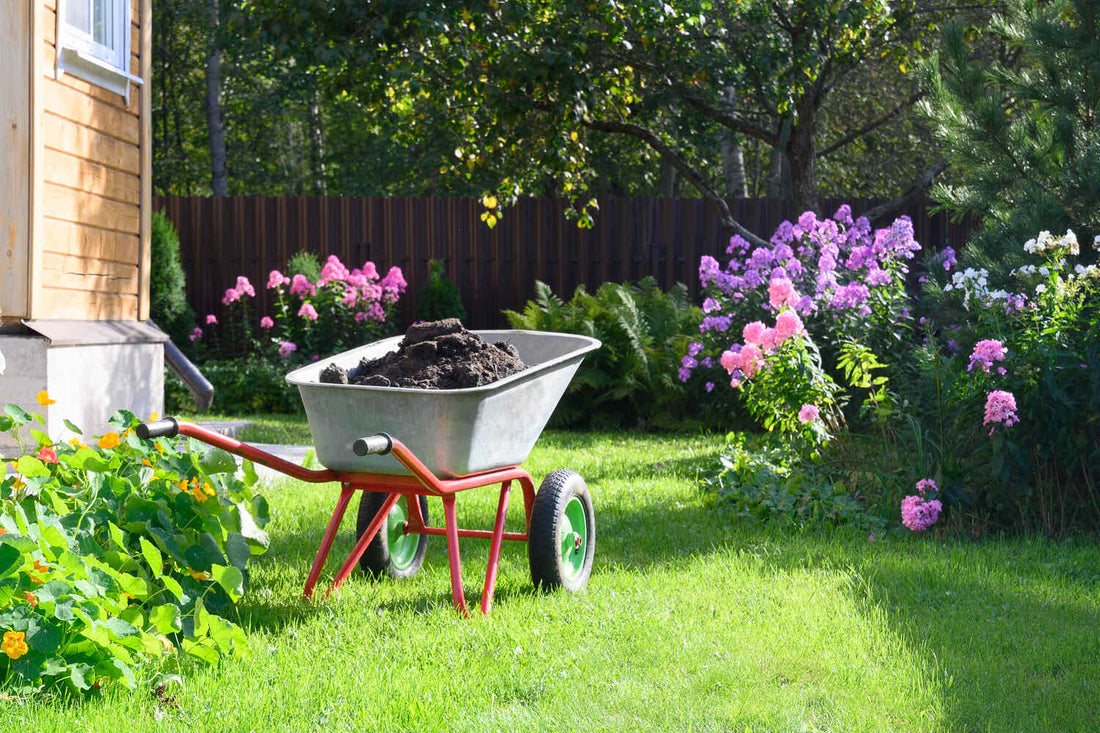Are you on a quest to achieve a lush, green lawn that will make your neighbors envious? If so, you've come to the right place. The question "Is 12-12-12 fertilizer good for lawns?" is one that many DIY lawn enthusiasts grapple with.
At Lawn Synergy, we understand that selecting the right fertilizer is crucial for the health of your lawn. If you're looking for a balanced approach to lawn care, 12-12-12 fertilizer might be just what your grass needs.
But is it really good for your lawn? In this article, we'll explore the benefits and potential drawbacks of using 12-12-12 fertilizer.
We'll also compare it to other common lawn fertilizers to help you make an informed decision. So, if you're ready to discover whether 12-12-12 fertilizer is the right choice for your lawn, continue reading.
What this article covers:What Is 12-12-12 Fertilizer?
12-12-12 fertilizer is an all-purpose, balanced fertilizer that contains equal parts nitrogen (N), phosphorus (P), and potassium (K), each at 12% by weight.
These three nutrients are essential for lawn health. Nitrogen is crucial for promoting lush, green growth, making your lawn look vibrant and healthy.
Phosphorus supports strong root development, which is vital for establishing a robust lawn that can withstand stress.
Potassium helps with disease resistance and overall hardiness, enabling your lawn to endure various environmental challenges.
Our findings show that balanced fertilizers like 12-12-12 are particularly favored for general lawn care, especially when soil nutrient levels are unknown.
By providing equal amounts of these key nutrients, 12-12-12 fertilizer offers a reliable solution for maintaining a healthy lawn, making it a versatile choice for many lawn care scenarios.

Is It Good for Your Lawn?
The effectiveness of 12-12-12 fertilizer largely depends on your lawn's specific needs. This balanced fertilizer works well in many situations, particularly for lawns that require equal amounts of nitrogen, phosphorus, and potassium.
If your lawn is healthy and you're looking for a general-purpose fertilizer to maintain its current state, 12-12-12 fertilizer can be a good choice.
However, if your soil is already rich in one or more of these nutrients, or if your grass type has specific nutrient requirements, this fertilizer might not be the best fit.
For instance, lawns that require higher levels of nitrogen for vigorous green growth or more phosphorus for strong root development might benefit from a different formulation.
At Lawn Synergy, we've observed that while 12-12-12 fertilizer is versatile, it's essential to consider your lawn's specific conditions and needs before choosing this or any fertilizer.
Established Turf
For established lawns, 12-12-12 fertilizer is a reliable option that delivers a balanced nutrient profile, which is essential for maintaining healthy grass throughout the growing season.
This type of fertilizer provides equal amounts of nitrogen, phosphorus, and potassium, the three primary nutrients that lawns need to thrive.
If your lawn is already in good condition and you want to sustain its health, 12-12-12 fertilizer can be an effective choice.
However, if your lawn shows signs of specific nutrient deficiencies—like yellowing grass indicating a lack of nitrogen or weak roots from insufficient phosphorus—you may need a fertilizer tailored to those needs. In such cases, other formulations might offer more targeted benefits.
We recommend assessing your lawn's specific requirements before choosing a fertilizer to ensure optimal results.

Brand New Lawn
If you're starting a new lawn from seed or sod, using a fertilizer with a higher phosphorus content is often necessary to encourage strong root growth.
Phosphorus is a critical nutrient for developing the root systems that will anchor your new grass and help it establish itself quickly and securely in the soil.
A fertilizer like our Starter Fertilizer 15-20-10 Plus Iron is specifically designed for this purpose, offering a higher phosphorus ratio that supports the rapid development of roots.
This formulation is particularly effective for certain types of grass like tall fescue, Bermuda, and zoysia, which require robust root systems to thrive.
While 12-12-12 fertilizer can still be used for new lawns, our experience shows that it may not provide the optimal nutrient balance needed for the early stages of lawn establishment.
For the best results, we recommend choosing a fertilizer tailored to the needs of new lawns, ensuring that your grass gets off to a strong start.
Things to Consider Before Fertilizing
Before you grab that bag of fertilizer, there are a few things to keep in mind to ensure you're making the best decision for your lawn.
Soil Test
We can't stress this enough—getting a soil test kit is crucial for effective lawn care. A soil test provides precise information about the nutrient levels in your soil, helping you determine exactly what your lawn needs to thrive.
Without a soil test, you're essentially guessing, which can lead to over-fertilization or under-fertilization, both of which can harm your lawn.
For instance, if your soil is already rich in phosphorus, using a balanced fertilizer like 12-12-12 might introduce more phosphorus than your lawn needs, potentially leading to issues like nutrient runoff.
In such cases, opting for a 12-0-12 fertilizer would be more appropriate, as it provides the necessary nitrogen and potassium without adding excess phosphorus.
By understanding your soil's specific needs, you can choose the right fertilizer to ensure your lawn stays healthy and vibrant.

The Time Of Year
Timing is everything when it comes to fertilizing your lawn. Early spring and fall are generally the most effective times to apply fertilizer, as the weather conditions during these seasons help maximize nutrient absorption without putting undue stress on your grass.
Fertilizing in early spring supports the vigorous growth that comes with warmer temperatures, while fall fertilization helps your lawn store nutrients and prepare for winter dormancy.
In contrast, fertilizing during the heat of summer can be risky, as high temperatures combined with dry conditions can stress your grass and potentially lead to burning or other damage.
Your Grass Type
Different types of grass have specific nutrient needs, and understanding these requirements is essential for choosing the right fertilizer.
For example, if you have centipede grass, you might wonder, “Is 10-10-10 fertilizer good for centipede grass?”.
While 10-10-10 fertilizer, which contains equal parts nitrogen, phosphorus, and potassium, can be used for centipede grass, it might not be the most optimal choice.
Centipede grass generally requires lower nitrogen levels compared to other grass types, and too much nitrogen can lead to excessive growth, which may cause thatch buildup and increase the grass's susceptibility to disease.
Therefore, it's important to choose a fertilizer that aligns with the specific nutrient needs of centipede grass. A lower-nitrogen fertilizer, such as 5-10-10 or another formulation tailored to centipede grass, would likely be more suitable.
Selecting the right fertilizer ensures that your grass gets the nutrients it needs without the risk of over-fertilization.
Conclusion
When it comes to lawn care, making the right choice can mean the difference between a thriving green space and a lackluster yard.
So, is 12-12-12 fertilizer good for lawns? Absolutely—but it's important to understand when and where it's most effective. This balanced fertilizer is ideal for maintaining an established lawn that already has its nutrient levels in check. However, if your lawn has specific nutrient deficiencies or you're laying down new sod or seed, other fertilizers might be more suitable.
At Lawn Synergy, we know that every lawn is unique, and that's why we're committed to helping you find the perfect solution tailored to your specific needs.
Whether you're looking to maintain a lush, established lawn or give new grass the best possible start, our expert advice and premium products are here to guide you every step of the way.
Ready to take your lawn to the next level? Explore our range of lawn care solutions and let Lawn Synergy help you achieve the lawn of your dreams.
If you want to learn more, why not check out these articles below:
- Is 13-13-13 Fertilizer Good for Lawns
- Is 15-15-15 Fertilizer Good for Lawns
- Is 20-10-10 Fertilizer Good for Lawns
- What Do You Put Down First: Grass Seed or Fertilizer?
- What Happens If You Apply Fertilizer to Wet Grass?
- What Does Fertilizer Do for Grass
- Best Fertilizer to Make Grass Green
- Will Fertilizer Burn Grass If Not Watered
- When to Fertilize Lawn
- When to Fertilize New Grass Seed
- When to Fertilize Lawn in Spring
- When to Weed and Feed Lawns
- When to Fertilize Centipede Grass
- When to Fertilize St. Augustine Grass
- When Is It Too Cold to Fertilize Lawn




